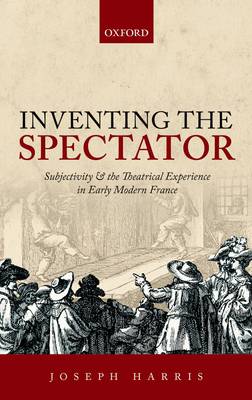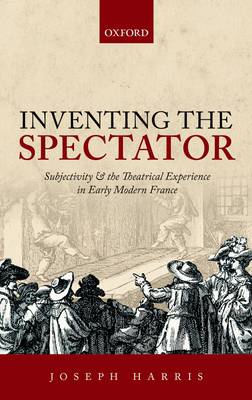
Bedankt voor het vertrouwen het afgelopen jaar! Om jou te bedanken bieden we GRATIS verzending (in België) aan op alles gedurende de hele maand januari.
- Afhalen na 1 uur in een winkel met voorraad
- In januari gratis thuislevering in België
- Ruim aanbod met 7 miljoen producten
Bedankt voor het vertrouwen het afgelopen jaar! Om jou te bedanken bieden we GRATIS verzending (in België) aan op alles gedurende de hele maand januari.
- Afhalen na 1 uur in een winkel met voorraad
- In januari gratis thuislevering in België
- Ruim aanbod met 7 miljoen producten
Zoeken
Inventing the Spectator
Subjectivity and the Theatrical Experience in Early Modern France
Harris
Hardcover | Engels
€ 241,95
+ 483 punten
Omschrijving
During the seventeenth and eighteenth centuries, France became famous - notorious even - across Europe for its ambitious attempts to codify and theorise a system of universally valid dramatic 'rules'. So fundamental and formative was this 'classical' conception of drama that it still underpins our modern conception of theatre today. Yet rather than rehearsing familiar arguments about plays, Inventing the Spectator reads early modern France's dramatic theory against the grain, tracing instead the profile and characteristics of the spectator that these arguments imply: the living, breathing individual in whose mind, senses, and experience the theatre comes to life. In so doing, Joseph Harris raises numerous questions - of imagination and illusion, reason and emotion, vision and aurality, to name but a few - that strike at the very heart of human psychology, cognition, and experience. Bridging the gap between literary and theatre studies, history of psychology, and intellectual history, Inventing the Spectator thus reconstructs the theatre spectator's experience as it was understood and theorised within French dramatic theory between the Renaissance and the Revolution. It explores early modern spectatorship through three main themes (illusion and the senses; pleasure and narrative; interest and identification) and five key dramatic theoreticians (d'Aubignac, Corneille, Dubos, Rousseau, and Diderot). As it demonstrates, the period's dramatic rules are at heart rules of psychology, cognition, and affect that emerged out of a complex dialogue with human subjectivity in all its richness.
Specificaties
Betrokkenen
- Auteur(s):
- Uitgeverij:
Inhoud
- Aantal bladzijden:
- 294
- Taal:
- Engels
Eigenschappen
- Productcode (EAN):
- 9780198701613
- Verschijningsdatum:
- 17/06/2014
- Uitvoering:
- Hardcover
- Formaat:
- Genaaid
- Afmetingen:
- 145 mm x 216 mm
- Gewicht:
- 498 g

Alleen bij Standaard Boekhandel
+ 483 punten op je klantenkaart van Standaard Boekhandel
Beoordelingen
We publiceren alleen reviews die voldoen aan de voorwaarden voor reviews. Bekijk onze voorwaarden voor reviews.









